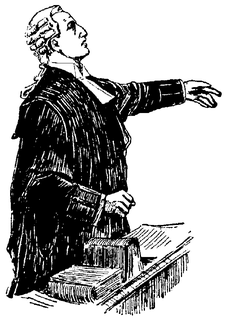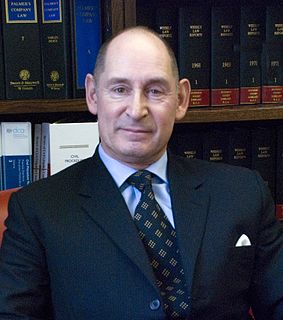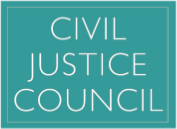
A barrister is a type of lawyer in common law jurisdictions. Barristers mostly specialise in courtroom advocacy and litigation. Their tasks include taking cases in superior courts and tribunals, drafting legal pleadings, researching the philosophy, hypothesis and history of law, and giving expert legal opinions.

The Court of Appeal is the highest court within the Senior Courts of England and Wales, and second in the legal system of England and Wales only to the Supreme Court of the United Kingdom. The Court of Appeal was created in 1875, and today comprises 39 Lord Justices of Appeal and Lady Justices of Appeal.

The Court of Chancery was a court of equity in England and Wales that followed a set of loose rules to avoid the slow pace of change and possible harshness of the common law. The Chancery had jurisdiction over all matters of equity, including trusts, land law, the estates of lunatics and the guardianship of infants. Its initial role was somewhat different: as an extension of the lord chancellor's role as Keeper of the King's Conscience, the court was an administrative body primarily concerned with conscientious law. Thus the Court of Chancery had a far greater remit than the common law courts, whose decisions it had the jurisdiction to overrule for much of its existence, and was far more flexible. Until the 19th century, the Court of Chancery could apply a far wider range of remedies than common law courts, such as specific performance and injunctions, and had some power to grant damages in special circumstances. With the shift of the Exchequer of Pleas towards a common law court and loss of its equitable jurisdiction by the Administration of Justice Act 1841, the Chancery became the only national equitable body in the English legal system.

Dame Vera Baird, is a British barrister serving as Victims' Commissioner for England and Wales.

The Supreme Court is the final court of appeal in the United Kingdom for all civil cases, as well as for criminal cases originating in England, Wales and Northern Ireland. It also hears cases of the greatest public or constitutional importance affecting the whole population.
The Civil Procedure Rules (CPR) were introduced in 1997 as per the Civil Procedure Act 1997 by the Civil Procedure Rule Committee and are the rules of civil procedure used by the Court of Appeal, High Court of Justice, and County Courts in civil cases in England and Wales. They apply to all cases commenced after 26 April 1999, and largely replace the Rules of the Supreme Court and the County Court Rules. The Civil Procedure Rules 1998 is the statutory instrument listing the rules.
The Judicial Appointments Commission (JAC) is an independent commission that selects candidates for judicial office in courts and tribunals in England and Wales and for some tribunals whose jurisdiction extends to Scotland or Northern Ireland.

There are various levels of judiciary in England and Wales — different types of courts have different styles of judges. They also form a strict hierarchy of importance, in line with the order of the courts in which they sit, so that judges of the Court of Appeal of England and Wales are generally given more weight than district judges sitting in county courts and magistrates' courts. On 1 April 2020 there were 3,174 judges in post in England and Wales. Some judges with United Kingdom-wide jurisdiction also sit in England and Wales, particularly Justices of the United Kingdom Supreme Court and members of the tribunals judiciary.

Terence Michael Elkan Barnet Etherton, Baron Etherton, is a British retired judge and member of the House of Lords. He was the Master of the Rolls and Head of Civil Justice from 2016 to 2021 and Chancellor of the High Court from 2013 to 2016.
The Civil Mediation Council (CMC) is the recognised authority in England and Wales for all matters related to civil, commercial, workplace and other non-family mediation. It is the first point of contact for the Government, the judiciary, the legal profession and industry on mediation issues.
The tribunal system of the United Kingdom is part of the national system of administrative justice with tribunals classed as non-departmental public bodies (NDPBs).
The Courts and Legal Services Act 1990 was an Act of the Parliament of the United Kingdom that reformed the legal profession and courts of England and Wales. The Act was the culmination of a series of reports and reforms that started with the Benson Commission in the 1970s, and significantly changed the way that the legal profession and court system worked.

The Judges' Council is a body in England and Wales that, representing the judiciary, advises the Lord Chief Justice on judicial matters. It has its historical roots in the original Council of the Judges of the Supreme Court, created by the Judicature Act 1873 to oversee the new Supreme Court of Judicature. This body initially met regularly, reforming the procedure used by the circuit courts, and the new High Court of Justice but met less regularly as time went on, meeting only twice between 1900 and 1907, with a gap of ten years between meetings in 1940 and 1950 respectively. After relative inactivity, it was eventually wound up through the Supreme Court Act 1981, which contained no provisions for its continued existence, something Denis Dobson attributes to newer bodies which performed the duties the Council had originally been created to do.

The High Court of Justice in London, known properly as Her Majesty’s High Court of Justice in England, together with the Court of Appeal and the Crown Court, are the Senior Courts of England and Wales. Its name is abbreviated as EWHC for legal citation purposes.
The Review of Civil Litigation Costs, or Jackson Review or Jackson Proposals, is a review of civil litigation costs in England and Wales conducted by Lord Justice Jackson in 2009, the final report, known as the Jackson Report, which was presented in January 2010.
Justices of the Supreme Court of the United Kingdom are the judges of the Supreme Court of the United Kingdom other than the president and the deputy president. The Supreme Court is the highest court of the United Kingdom for civil and criminal matters in the juristictions of England and Wales and Northern Ireland. Judges are appointed by the Queen on the advice of the Prime Minister, who receives recommendations from a selection commission. The number of judges is set by s.23(2) Constitutional Reform Act 2005, which established the Court, but may be increased by the Queen through an Order in Council under s.23(3). There are currently 12 positions: one President, one Deputy President, and 10 Justices. Judges of the Court who are not already peers are granted the style Lord or Lady followed by a surname, territorial designation or a combination of both, for life.

An Act of Sederunt is secondary legislation made by the Court of Session, the supreme civil court of Scotland, to regulate the proceedings of Scottish courts and tribunals hearing civil matters. Originally made under an Act of the Parliament of Scotland of 1532, the modern power to make Acts of Sederunt is largely derived from the Courts Reform (Scotland) Act 2014. Since 2013, draft Acts have also been prepared by the Scottish Civil Justice Council and submitted to the Court of Session for approval.

In the legal system of England and Wales, there is a history of involving lay people, namely people from the local community who are not required to hold any legal qualifications, in the judicial decision-making process of the courts. They are called justices of the peace or magistrates.

The judiciary of Scotland are the judicial office holders who sit in the courts of Scotland and make decisions in both civil and criminal cases. Judges make sure that cases and verdicts are within the parameters set by Scots law, and they must hand down appropriate judgments and sentences. Judicial independence is guaranteed in law, with a legal duty on Scottish Ministers, the Lord Advocate and the Members of the Scottish Parliament to uphold judicial independence, and barring them from influencing the judges through any form of special access.

The Sheriff Appeal Court is a court in Scotland that hears appeals from summary criminal proceedings in the sheriff courts and justice of the peace courts, and hears appeals on bail decisions made in solemn proceedings in the sheriff court. The Sheriff Appeal Court also hears appeals in civil cases from the sheriff courts, including the Sheriff Personal Injury Court.










